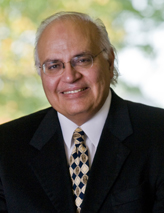Dr. Moeness Amin Is Selected to Receive EURASIP's Technical Achievement Award

The European Association for Signal Processing (EURASIP) has announced that Dr. Moeness Amin, Director of the College of Engineering’s Center for Advanced Communications (CAC) and a member of the faculty since 1985, will be the recipient of EURASIP’s Technical Achievement Award. Dr. Amin will be honored at the 2009 European Signal Processing Conference, which will be held in Glasgow, Scotland, in August. He is the eighth person—and only the third from the United States—to earn this distinction since EURASIP’s founding in 1978.
This award is significant for several reasons. First, it recognizes the contributions that Dr. Amin has made in three separate areas of signal processing: radar imaging, communications, and navigation. In addition to research findings that he has disseminated over the past 25 years through 400 journal articles and conference papers, Dr. Amin has led major projects that have clear applications and have yielded tangible solutions to critical problems.
Second, the award speaks to the reputation that the CAC Director enjoys in the international community, especially Europe. He has coauthored journal papers with scientists from five European countries, published and participated in many European conferences, and reviewed papers for European journals. At institutions around the world, Dr. Amin has served as an external examiner for several doctoral dissertations and has evaluated numerous tenure and promotion cases.
Finally, this distinction testifies to the academic climate of Villanova University and the College of Engineering, where faculty members can dedicate themselves to education and scholarship—and achieve excellence in both. “This award is a great honor for Moeness and the CAC team, as well as for the Department of Electrical and Computer Engineering, the College, and the University,” Dr. Gary A. Gabriele, the Drosdick Endowed Dean of Engineering, said. “It demonstrates that the Villanova College of Engineering fosters top research that can be consistently conducted over a faculty career.”
